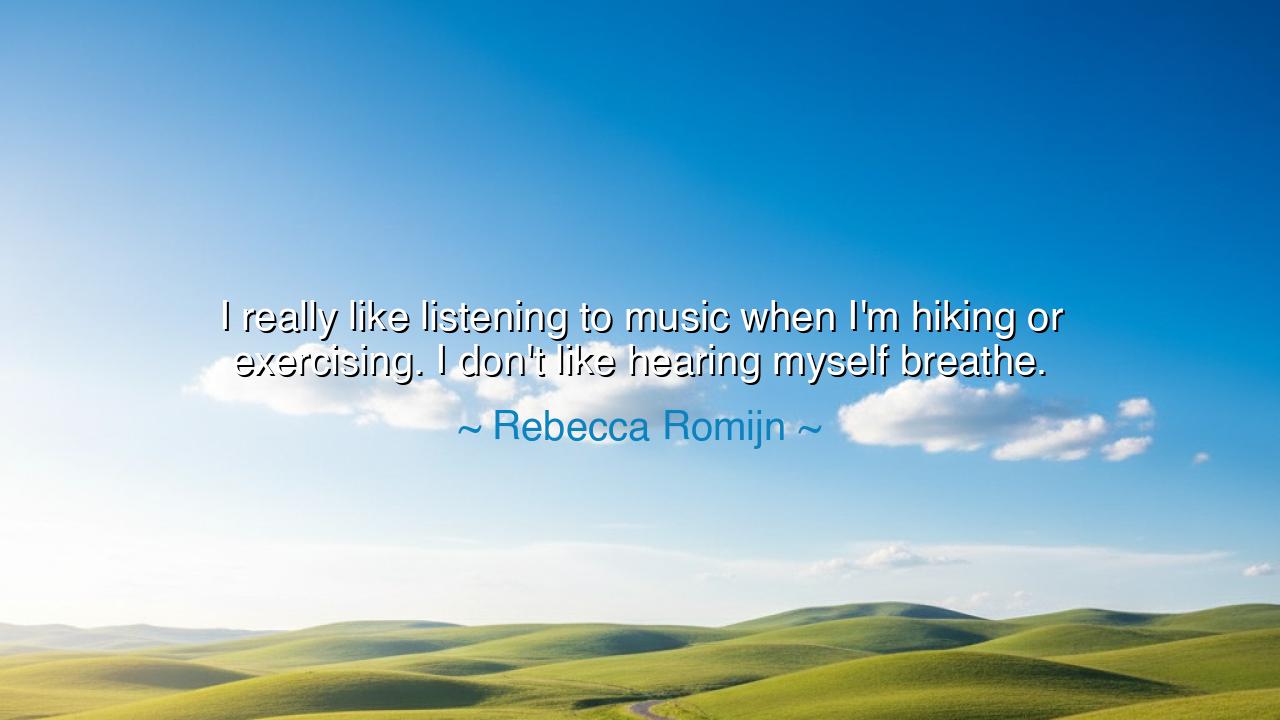
I really like listening to music when I'm hiking or exercising.
I really like listening to music when I'm hiking or exercising. I don't like hearing myself breathe.






The words of Rebecca Romijn — “I really like listening to music when I’m hiking or exercising. I don’t like hearing myself breathe.” — though simple in sound, conceal within them a profound reflection on the human spirit. She speaks not merely of the act of walking or training the body, but of the eternal struggle between the noise of our limitations and the harmony of our aspirations. For in the sound of our breathing, we are reminded of toil, of strain, of weakness. But in music, we hear beauty, rhythm, and strength that carry us beyond the weight of the moment.
The ancients understood this well. When armies marched into battle, they were accompanied by horns, drums, and flutes. The music did not give them more breath, but it gave them more courage. It covered the sound of their weariness with the thunder of rhythm, transforming fear into resolve. So too does Romijn, in her simple confession, echo an ancient practice: to drown out the voice of fatigue with the melody of music, to let the spirit rise above the body’s limitations.
Consider the story of Pheidippides, the runner of Marathon, who carried news of victory to Athens. His lungs burned, his body faltered, but he pressed on. Had he been accompanied by music, perhaps the weight of his own breathing would not have crushed his resolve so quickly. For music is not merely sound — it is a companion, a force that transforms struggle into something almost divine. To hear one’s own breath is to dwell in limitation; to hear music is to dwell in possibility.
And yet, Romijn’s words reveal something more. The dislike of hearing one’s own breath is not merely distaste for sound, but a refusal to be imprisoned by self-consciousness. Breath reminds us of labor, of mortality, of the body’s fragility. Music, by contrast, connects us to what is eternal, to harmony, to the unseen. To choose music while hiking or exercising is to say: “I will not be defined by strain. I will instead walk with beauty, and let my spirit hear not weakness, but song.”
This lesson extends beyond hiking trails and exercise halls. In life, we all hear the “breath” of our struggles: the complaints of fatigue, the sighs of despair, the gasps of doubt. Left unchecked, these sounds can dominate our journey. But if we clothe our days with music — with hope, with joy, with the harmonies of gratitude — we can rise above the noise of our own limitations. Music becomes the shield against despair, the rhythm that carries us through the steep climb of life.
The lesson, therefore, is to fill your path with beauty. When you are weary, turn to music or whatever brings your soul harmony. Do not let the harsh sound of your own limitation define you. Instead, overlay it with something higher, something that calls you forward. Just as Romijn chooses to hear music instead of breath, so too can you choose to hear possibility instead of despair, hope instead of fear.
Practical action follows: when you walk, let your spirit walk with a song. When you labor, let your toil be adorned with rhythm. And when you feel the weight of your own mortality pressing in, do not listen only to the sound of your weakness, but to the music of life that still flows within you. For the ancients knew, and Romijn reminds us, that music is not only for celebration, but also for endurance.
Thus, O seeker, remember this: you are more than the sound of your breath. You are a vessel of rhythm, a child of harmony, a soul that can choose melody over fatigue. Let music be your companion, and the climb will not break you — it will lift you into something greater.






AAdministratorAdministrator
Welcome, honored guests. Please leave a comment, we will respond soon